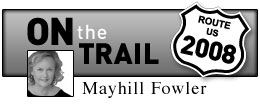
ST PAUL -- Warning that reading this piece is going to be like watching an episode of Generation Kill. You know the outcome -- in this instance, that Sarah Palin nails the speech at the Republican Convention that introduces her to the country -- even as the story unfolds.
Twelve hours earlier. It's still Sarah, Sarah, Sarah here, the mood escalating between now-steady satisfaction in public and underlying anxiety in private. "Steve Schmidt has taken her in hand," a delegate said to the little group, including me, waiting to get into the Minnesota breakfast meeting. He seemed to be bolstering confidence. A woman tried to match his tone by offering an anecdote about her delegation's bus driver. "He's a Republican," she assured us, "and he said last night that he liked her." Inadvertently, the delegate underscored the uncertainty: would other voters besides the Republican delegations take to Sarah Palin?
 At a late afternoon reception hosted by Human Rights First, where several retired generals spoke out against the use of torture, I asked Bud McFarlane, national security adviser to Ronald Reagan and now adviser to John McCain, if he thought Sarah Palin had the foreign policy experience to be vice president. When Spiro Agnew resigned, McFarlane said, it had been his responsibility to bring Jerry Ford, who had no foreign policy experience, up to speed. McFarlane had given Ford several thick briefing notebooks and worked with him; but still it had taken six months. "That's how long it takes," McFarlane said, "six months." And he reminded me about Nixon's resignation, and how in his first months in office President Ford had had to meet with the Russians [with Brezhnev to work on the SALT Treaty in November 1974, a year after he succeeded Agnew as Vice President].
At a late afternoon reception hosted by Human Rights First, where several retired generals spoke out against the use of torture, I asked Bud McFarlane, national security adviser to Ronald Reagan and now adviser to John McCain, if he thought Sarah Palin had the foreign policy experience to be vice president. When Spiro Agnew resigned, McFarlane said, it had been his responsibility to bring Jerry Ford, who had no foreign policy experience, up to speed. McFarlane had given Ford several thick briefing notebooks and worked with him; but still it had taken six months. "That's how long it takes," McFarlane said, "six months." And he reminded me about Nixon's resignation, and how in his first months in office President Ford had had to meet with the Russians [with Brezhnev to work on the SALT Treaty in November 1974, a year after he succeeded Agnew as Vice President].
Right now "a friend" is working with Palin on foreign affairs, McFarlane said, adding, "Clearly, she is very intelligent." "It's a good sign that she hasn't been afraid to say what she doesn't know and to ask questions." (Presumably, McFarlane and friend have been in touch.) That was Ronald Reagan's strength, McFarlane said. "He [Reagan] knew nothing about arms control or the Middle East, and he was always quick to remind us that." But then McFarlane reiterated the six-month time frame. Like the delegate at the Minnesota breakfast, he would seem to have something about Palin on his mind.
Only hours earlier, I had heard Bud McFarlane speak about "The Use of Smart Power," as opposed to hard and soft power, on a foreign relations panel at the Hubert Humphrey Center at the University of Minnesota. Nina Easton of Fortune, etc. asked questions of Ambassador to the Sudan Richard Williamson, former U.S. trade representative to the U.N. Rob Portman (floated as a potential McCain vice presidential choice), Joe Lieberman and Bud McFarlane. Senator Lieberman did not disappoint; indeed he spoke much better than he did the previous evening to the convention. (Sudden thought: Randy Scheunemann, the Director of Foreign Policy and National Security to the McCain Campaign, was supposed to speak on the panel. Lieberman was the pinch-hitter. Could Scheunemann be McFarlane's friend?)
Nina Easton asked Joe Lieberman how non-military means could attack the problem of Islamic terrorism. "Voters see him [McCain] inclined to the military option," Lieberman said, "but John has a veteran's distaste for military conflict." "John is a reformer," Lieberman continued, "he's gonna take a very fresh look at our foreign and defense agencies -- you can expect a shake-up here." Lieberman was the first panelist to mention a McCain house cleaning, but not the last -- later McFarlane mentioned the State Department -- so this would seem to be something John McCain has been talking about among friends. ("John McCain is going to subject every government agency to a top-to-bottom review, and post the results on the internet, for every American to see," Carly Fiorina says in the Palindome as I'm writing this from the press filing center.)
All the panelists addressed the need for support of schools in the Islamic world -- and addressed the need in such a way that demonstrated the kind of policy experience that comes from years of observation and thinking and conversing with peers in other countries that will be difficult for Sarah Palin to acquire quickly. "There's an idea that's been bouncing around a lot -- Tony Blair had a good idea, to start an education foundation to build public schools in the Islamic world," Lieberman said. John McCain and he had talked to both Tony Blair and his successor Gordon Brown about such a plan. "That's an idea those two prime ministers have had," Lieberman said. "How do you stop the cycle of ideological hatred? You get them in a better school." Such a foundation would have to exercise accountability and ultimately be indigenous, Lieberman added. Again, it's hard to imagine that Sarah Palin could get up to speed fast on the implications and structural issues of such an initiative, especially since she doesn't seem to have a far-ranging, inquiring mind, despite her native intelligence. Specifically on the subject of education, by the by, she hasn't shown much interest, for she hasn't put a chunk of Alaskan oil revenues into her state's schools.
The other issue that all the panelists addressed is the rise of protectionist sentiment, as Rob Portman called it. "It's sad to see trade become a political football," Portman said, before going on to discuss the Central American Free Trade Agreement at some length. Lieberman took up the topic with the South Korean Free Trade Agreement after a historical reprise of how "deeply committed" the Clinton-Gore Administration was to free trade. "Obama has turned his back on a bipartisan policy," Ambassador Williamson said before bringing up the subject of the collapse of the recent Doha talks, when India and China walked out. How does the U.S. recalibrate its relationship to these energy powers? The collapse of Doha is "the canary in the mineshaft," the Ambassador said.
Eight hours later, Governor Palin identifies herself to the nation as "a gal that knows the north slope of Alaska." At this point, there's no reason to think that she does not. But when she alludes to "energy as a weapon in the Caucasus," she sounds coached, just as she does in her encapsulated remarks on Iran, Saudi Arabia and Venezuela and their oil supplies. Seconds later, she returns to what seems to be her own voice when she says that "our opponents" tell us drilling won't solve our problems, "as if we didn't know that already." Energy issues are the geographic center of Palin's speech, in which she deftly combines an introduction of herself and her family, a tribute and an endorsement of John McCain and sly, witty attacks on Barack Obama. The glue is a small-town point of view, however artfully crafted, that is going to be hard for Joe Biden to swallow. But that's what he needs to do, or he will be driving small-town and rural voters into the McCain-Palin camp just as yellow journalism (via the blogosphere) is threatening to do now, and he can campaign from Scranton to Lancaster and back until the cows come home and never deliver Pennsylvania for Obama.
Sarah Palin has a great smile and sparkling eyes behind those (suddenly updated) glasses. She exudes vitality and spunk. Her Midwestern accent heartland Americans are going to love. But most of all she has a wicked sense of humor -- blue collar without the chip on the shoulder that can undercut -- and a fair sense of timing that are going to be her advantages over Joe Biden in St. Louis. That October Debate is the next test for Sarah Palin, unless the media unravels her life story first. The challenge for Joe Biden is to expose the Palin combination of certitude and shallowness without attacking her small-town persona. Biden has to lead undecided voters to ask themselves where they've seen Palin before. The latest surprise in Election 2008 is that it's Sarah Palin, not John McCain, who is Bush III. Of course, she's much more than Bush, and the ways in which she's thrilled many Americans to the core are going to shape the political fortunes of women with eyes on the presidency from this day forward.
